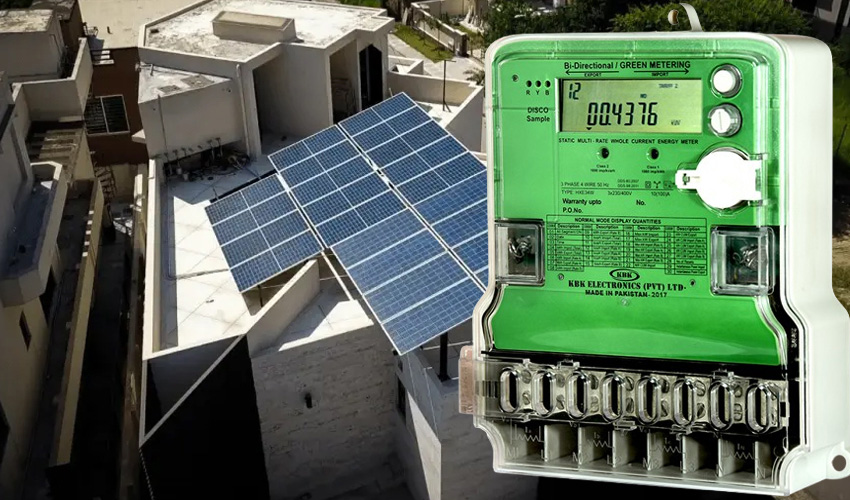The federal government has delayed the implementation of its controversial decision to slash the buyback rates for solar net metering, following widespread criticism from stakeholders and concerns raised within the cabinet.
The move to reduce the buyback rate—from Rs 27 per unit to Rs 10—had sparked intense backlash, with experts warning of severe financial consequences for solar consumers and the renewable energy sector.
The federal cabinet, led by Prime Minister Shehbaz Sharif, has now directed the Power Division to reassess the policy and conduct further consultations before finalizing the revised framework.
Solar net metering policy under review
According to sources, the cabinet’s decision to delay the approval came after several senior members expressed reservations about the proposed changes. The Economic Coordination Committee (ECC) had earlier approved amendments to the Distributed Generation and Net Metering Regulations on March 13, citing the need to ease the financial burden on grid-connected consumers.
The government argued that the rapid expansion of solar net metering had shifted financial costs onto conventional electricity consumers. Official data indicates that the number of solar net-metering users stood at 283,000 as of December 2024, with payouts to solar consumers reaching Rs 159 billion last year. Projections suggest this figure could escalate to Rs 4,240 billion by 2034 if no policy changes are made.
However, the proposed revisions triggered strong opposition from renewable energy advocates. Critics contended that cutting buyback rates would discourage solar adoption, disrupt existing investments, and lead to job losses in the solar industry.
Industry concerns over policy shift
The Renewable Energy Association of Pakistan (REAP) voiced concerns that the amendments—including the introduction of gross metering in place of net metering—could push consumers towards off-grid solar solutions. The shift could adversely impact solar businesses, reduce government revenues, and render costly imported inverters obsolete.
REAP identified three major risks associated with the changes:
- A potential decline in employment opportunities within the solar sector
- Increased reliance on off-grid systems, which could lower government tax revenues
- Financial losses for consumers who have invested in high-cost inverters based on previous policies
Experts have also criticized power distribution companies (Discos) for failing to anticipate the impact of solar adoption and the need for a sustainable regulatory framework.
While some energy analysts argue that the government’s decision could benefit industrial consumers in the long run, others maintain that discouraging solar adoption will weaken Pakistan’s renewable energy ambitions.
In addition to the reduced buyback rate, the government has shortened the duration of net metering contracts from 10 years to 5 years. Consumers exporting surplus electricity to the grid will now receive payments based on the National Average Power Purchase Price (NAPPP).
New regulations also introduce stricter installation standards, including capacity caps and mandatory use of specific inverters. Meanwhile, authorities are working on reducing overall electricity tariffs by shutting down inefficient power plants and renegotiating agreements with Independent Power Producers (IPPs).
Cabinet calls for further consultations
Amid the mounting criticism, the federal cabinet has directed the Power Division to resubmit the solar net metering regulations after consultations with stakeholders. The decision was announced following a cabinet meeting that also reviewed Pakistan’s $1.3 billion loan agreement with the International Monetary Fund (IMF).
The statement issued after the meeting highlighted several other key decisions, including:
- Approval of revised agreements for power generation from bagasse
- Passage of the Whistleblower Protection and Vigilance Commission Act 2025
- Amendments to tax laws affecting Islamabad, including revisions to the Income Tax Amendment Bill
- Ratification of decisions made by the Cabinet Committee on Privatization and the ECC on March 13 and March 21
- The cabinet also approved measures to pass on the benefit of falling petroleum prices to electricity consumers
Despite the temporary pause, government officials have reiterated their commitment to rationalizing solar net metering regulations to prevent an imbalance in the power sector. Power Minister Rehan Jawed stated that over 4,000 MW of solar energy has already been integrated into the national grid, with expectations to exceed 12,000 MW in the next eight years.
While the final policy direction remains uncertain, stakeholders continue to urge the government to adopt a balanced approach that promotes renewable energy while ensuring fair cost distribution among all electricity consumers.



























